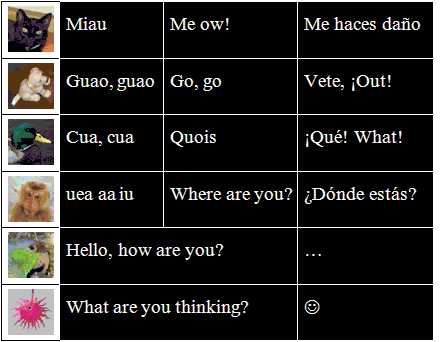5.c) Genetic foundation and the origin of language
If the study of memory presents unresolved questions, now these questions multiply.
From the book about Intelligence, Intuition and Creativity and the previous sections on the memory book of the Global Cognitive Theory, there are some guidelines on the factors on its configuration, especially in those on evolutionary genetics and its origin.
-
Linguistic intelligence
It operates with low reliability in comparison to logical math intelligence and intuition modes.
It deals with ultra-fast responses of intelligence seen in the section the origin of language.
Semantic memory
Regardless of the existence of short, medium, and long-term semantic memory, and with a greater or lesser degree of reliability, its general characteristic does not require exact words for a specific idea.
Now is not the time to go any deeper into the aspect of written language, although the ideas and arguments would be similar.
The velocity of speaking reduces when trying to achieve greater precision.
The merging of linguistic intelligence and semantic memory produces spectacular results in language.
In the previous section, “A philosophical trend supports an active constituent of genetics in language. The linguist Noam Chomsky is the most important representative of innatism in contraposition to constructivism. Chomsky affirmed, many years ago, to have identified common elements to all the languages of the human beings, what it meant a genetic predisposition to the language development. Although it is not clear if he included as humans the Neanderthal and Denisovans.”
It seems correct the idea of the language genetic base but without denying the other side of the coin: not all humans have the same predisposition in quantitative terms. Otherwise, it would be like the work of instant divine creation.
The human brain still needs years of development to acquire a reasonable control of language and, even so, there are vast and noticeable differences in command of the language among humans.
Although it may seem less attractive at first; the effort of looking for its beauty will surely bring benefits.
With both the theory of Natural Selection and the Conditioned Evolution of Life, the complexity of language should have a non-identical genetic load for all individuals.
The Conditioned Evolution of Life proposes a genetic foundation and, consequently, the differences among groups and, to a lesser extent, in individuals are due to genetic differences.
If we examine the Mendelian genetic evolution with the Darwinism, we arrive at similar results. Darwin’s most significant contribution is that man comes from an ape.
The semantic capacity has developed from a very primitive stage; from primates to more advanced stages. It would be fantastic to identify how the number of words has evolved throughout history.
Genetic derivation or accumulation
Even with random mutations due to natural selection, those producing a comparative advantage will have more descendants. Small increases in the semantic capacity will tend to establish themselves genetically.
-
The rate of the increase due to evolutionary genetics
Despite recognizing that it could have varied due to physiological changes that benefited language, such changes will have required quite a few generations to reach the entire human population.
Furthermore, it is unreasonable that the total increase in the number of words happened along with the first steps of the Homo Sapiens.
Increase due to evolutionary genetics 
Variability of existing languages
It is not known the number of words in the current idioms, but they should vary quite a bit, and the very concept of a word would pose a significant problem for such calculations.
Evolutionary advantages
Given that language implies an apparent comparative advantage, it should have taken place at the maximum increasing rate allowed, whatever their general causes may be.
Exponential growth
Previous arguments infer an exponential growth with a greater or lesser rate at certain times.
Subsequently, the more significant increases in absolute terms should belong to the last thousands of years, keeping in mind the current Homo Sapiens have only been in existence during 50,000 years in rounded figures.
It is true that the halt of Western civilization of the first five hundred years of the Christian calendar partly contradicts the previous arguments. However, it must be understood such as how the Roman and Greek cultures were a very reduced genetic foundation in population and the process of expansion; they ceased being visible during an extended period due to reasons relating to this genetic configuration of the operations that maintained the intellectual capacities.
In summary, the language genetic evolution is indisputable, and its significance will depend on the temporal and spatial scale of the analysis; in the long term, it would be very high with either the theory of Natural Selection or the Conditional Evolution of Life.
In the short-term, on an individual level, it would be almost complete with the Conditional Evolution of Life, and with Darwin’s theory somewhat reduced.
Nevertheless, the Darwinism fails for the Homo Sapiens language, given that it would have needed a long-term that has not existed. It has only two thousand generations to produce favorable mutations and spread to the entire population and only forty human generations in the last thousand years.
The exponential growth seems contrived; whichever theory we use.
* * *
When Don Magufo finishes the book,
he happily calls Einsotro
to thank him for his collaboration.
Who puts on a pensive face and says:
–Thanks very mucho. –
Afterwards, Don Magufo happily calls Mª José.
She tells him:
–Thanks very macho. –
He then thinks:
Thanks God I haven't called Goblin!
